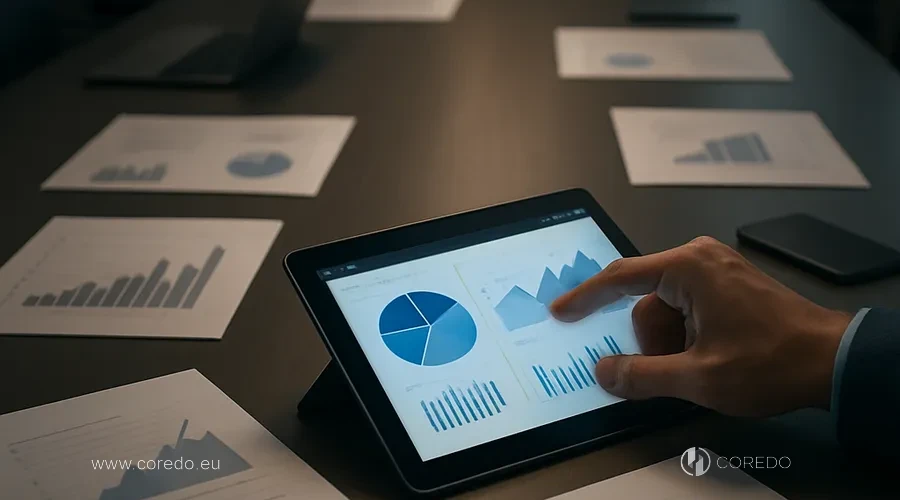Types of bank licenses
Types of bank licenses determine which financial operations credit institutions are allowed to carry out, and banks can operate only after obtaining one of such authorizations from the Central Bank. Each license type sets its own requirements and limits of authority for the bank, which is important to consider when launching or choosing a bank for cooperation.
Basic bank license: what is it?
In the EU and CIS countries, such a license allows carrying out classic banking operations: lending, attracting deposits, opening accounts for individuals and legal entities, as well as conducting basic settlement operations.
For example, in the Czech Republic and Slovakia this indicator starts from 5 million euros, in Estonia from 1 million euros, which makes this format attractive for startups and regional banks. Nevertheless, COREDO’s practice confirms: operation restrictions and the inability to open foreign branches significantly narrow scaling horizons. Regulation of credit institutions with a basic license is stricter, and banking supervision is stringent, especially in terms of risk management and internal audit.
The register of licensed banks in the EU is maintained by national regulators (for example, the ČNB in the Czech Republic, the FSA in Estonia), and the requirements for obtaining a license include a comprehensive review of capital structure, sources of funding and the qualifications of top management.
Benefits of a universal banking license
A universal bank license is the key to international expansion and business diversification. This type of license grants the right to carry out all types of banking operations, including investment services, issuance of securities, asset management, opening branches abroad and acquiring stakes in foreign banks.
The minimum authorized capital for a universal license is significantly higher: in the EU it starts from 5–10 million euros, in the United Kingdom from 18 million pounds sterling. The corporate structure of a credit institution becomes more complex, and the requirements for corporate governance and internal audit are stricter. COREDO’s experience has shown that strategic planning of banking activities at the licensing stage makes it possible to build in opportunities for scaling in advance, reduce costs for subsequent reorganization and increase the bank’s investment attractiveness.
For corporate clients, a universal license opens access to comprehensive financial products, international settlements and risk management tools. As part of one of COREDO’s projects for a bank in Singapore, a model was implemented that allows integrating subsidiary structures in the EU and Asia, which provided flexibility and resilience of the business to regulatory changes.
Fintech license or digital bank license
Fintech license: this is a specialized tool for companies providing electronic payment services, mobile wallets, online lending and other innovative services. In the EU, the key standard is PSD2 (Payment Services Directive 2), which regulates electronic payment systems and licensing requirements for PSP (Payment Service Providers) and EMI (Electronic Money Institutions).
Minimum authorized capital requirements for a fintech license are significantly lower than for traditional banks: for PSPs, from 125 thousand euros; for EMIs, from 350 thousand euros. The digital transformation of banks makes it possible to launch fully online banks with minimal physical presence, which is especially relevant for the markets of Asia and the EU. The COREDO team implemented digital bank licensing projects in Estonia and Singapore, where the key success factors were flexible IT infrastructure and the implementation of AI-based KYC procedures.
Thus, licensing specifics in the fintech sector are directly related to the requirements for electronic money and payment institutions, which will be discussed in more detail below.
License for electronic money and payments
Electronic money issuer license (EMI) and a payment services license (PSP) are the basis for launching modern electronic payment systems, card issuance, international transfers and mobile payments. In the EU these licenses are regulated by PSD2 and require strict adherence to AML compliance and financial monitoring standards.
A particularity of licensing is the need to build a reliable risk management system, implement Due Diligence procedures and maintain ongoing interaction with a compliance officer. COREDO’s practice confirms: the implementation of automated transaction monitoring systems allows not only to meet regulatory requirements but also to reduce operational costs.
Licenses for microfinance organizations, insurance and investment companies
Microfinance organizations (MFOs), insurance and investment companies require separate types of licenses, which are regulated by national and international standards. A license for an MFO allows providing microloans, and an insurance services license enables launching life, property and liability insurance products. Licensing of investment companies covers brokerage activities, asset management and collective investments.
Financial monitoring and capital requirements for such organizations vary by jurisdiction: for MFOs in the EU – from 50 thousand euros, for insurance companies – from 3 million euros, for investment companies: from 125 thousand to 730 thousand euros. The solution developed by COREDO for an international investment company included comprehensive preparation for due diligence procedures and internal audit, which made it possible to successfully obtain licensing in several jurisdictions at once.
Stages of obtaining a banking license

Stages of obtaining a banking license: this is a sequence of legal procedures and requirements that must be fulfilled to open a full-fledged bank. Each stage is regulated by federal legislation and includes key issues such as the size of the minimum authorized capital, document preparation, and the review of the application by the Bank of Russia.
Minimum authorized capital: how much is needed?
In the EU, a basic license requires from 1 to 5 million euros, for a universal license: from 5 to 10 million euros and above. In the UK and Singapore requirements may be even stricter, especially for banks with an international structure.
The capital structure must be transparent, with a clear definition of sources of funds and shareholders’ stakes. The investment attractiveness of banks directly depends on the quality and transparency of capital: COREDO’s practice shows that regulators pay special attention to the origin of funds, ownership structure, and the presence of strategic investors. For fintech companies and EMIs the minimum authorized capital is significantly lower, but requirements for financial stability and reserves remain high.
Registration of a credit institution and the banking register
State registration of a credit institution is the first step on the way to obtaining a license. Due diligence procedures include verification of all participants in the corporate structure, analysis of funding sources, and assessment of the management team’s qualifications. Internal audit and corporate governance become mandatory elements already at the document submission stage.
The register of licensed banks is maintained by national regulators: in the EU by national central banks, in the UK – FCA and PRA, in Singapore – MAS. A solution implemented by COREDO for a client in Estonia made it possible to accelerate state registration by digitalizing document flow and integrating internal audit procedures at early stages.
Banking license in the EU, Asia, Africa: documents and procedures
The process of obtaining a banking license in the EU, Asia and Africa differs significantly in details, but includes a number of universal stages:
- Preparation of a business plan and financial model.
- Collection of the set of founding and corporate documents.
- Confirmation of the capital structure and sources of funding.
- Development of AML and KYC policy.
- Appointment of a compliance officer and internal auditor.
- Undergoing due diligence procedures and interviews with the regulator.
In the EU special attention is paid to compliance with international licensing standards and requirements for authorized capital. In Asia the focus is on innovative technologies and digital transformation, and in Africa – on financial inclusion and resilience to risks. COREDO’s experience shows: adapting documents to the specifics of each jurisdiction can significantly reduce application review times and increase the likelihood of approval.
AML compliance and KYC: what is it?
AML compliance for banks is not only a regulatory requirement, but also a tool for protecting the business from financial and reputational risks. Implementing KYC procedures (Know Your Customer) and financial monitoring systems makes it possible to detect suspicious transactions, prevent money laundering and the financing of terrorism.
The COREDO team develops comprehensive AML policies, integrating the best international practices and automated solutions for monitoring operations. Appointing an experienced compliance officer and regularly updating due diligence procedures become mandatory conditions for successful licensing and subsequent control over the activities of credit institutions.
Types of banking licenses: comparison
| License type | Main operations | Minimum capital | Features/Restrictions | Applicable jurisdictions |
|---|---|---|---|---|
| Basic bank license | Lending, deposits | Medium | Restrictions on operations and branches | EU, CIS |
| Universal bank license | All banking operations | High | Possibility of international expansion | EU, Asia, Africa |
| Fintech license | Electronic payments, online services | Medium/low | For fintech companies, digital banks | EU, Asia |
| Electronic money issuer license | Issuance of electronic money, payments | Medium | PSD2, electronic payment systems | EU, Asia |
| License for MFIs/Payment institutions | Micro-lending, payment services | Low | Limits on size and operations | CIS, Asia, Africa |
| Insurance/investment license | Insurance, investment services | Medium/high | Risk and capital requirements | EU, Asia, Africa |
Licensing of banks in the EU, Asia and Africa

Bank licensing in the EU, Asia and Africa forms the legislative and organizational basis for the functioning of the financial sector and sustainable economic development, ensuring stability, transparency and market integration. Regional specifics and current regulatory reforms – for example, the introduction of PSD2 in Europe – reflect global trends and the specific tasks of each region.
PSD2 in European banking regulation
European banking regulation is based on EU directives, including CRD IV, CRR and PSD2. PSD2 has become a driver of digital transformation for banks, opening the market to fintech companies and electronic payment systems. Requirements for authorized capital for a banking license in Europe vary depending on the type of license, and the licensing procedure includes the mandatory implementation of AML/KYC and financial monitoring.
COREDO’s practice shows that successful licensing of banks in the EU is possible only with a deep understanding of European corporatcorporate governance, internal audit and strategic planning.
Bank and fintech licensing in Asia
In Asia, licensing of banks and fintech companies is characterized by high dynamism and a focus on innovation. Regulators in Singapore, Hong Kong and Malaysia actively support the digital transformation of banks, the implementation of electronic payment systems and the development of licenses for PSPs and EMIs. Minimum capital requirements may be lower than in the EU, but oversight of credit institutions’ activities and IT infrastructure requirements are extremely strict.
Licensing of banks and MFIs in Africa
African markets are characterized by a high degree of financial inclusion and rapid growth of microfinance institutions. Licensing banks in Africa requires a special approach to financial monitoring, risk management and compliance with international standards. Licenses for MFIs and licenses for international transfers become key tools for entering markets with a large share of the population unserved by banking services.
How to obtain a banking license

Obtaining a banking license is an essential step for institutions planning to conduct banking activities on a legal basis and under state supervision. Depending on the chosen format and jurisdiction, there are different types of licenses for an international bank, which it is important to familiarize yourself with at the start of the process.
Types of licenses for an international bank
The choice of license type for an international bank depends on the business model, target markets and strategic priorities. For corporate clients and banks focused on international settlements, the optimal solution is a universal license with the ability to open branches abroad and work with non-resident banks.
Licensing and scaling the business
Licensing of credit institutions directly affects the ability to scale the business, investment attractiveness and strategic risks. Introducing new types of banking licenses allows expanding the product range, entering new markets and attracting strategic investors. The ROI from implementing a universal license can be several times higher thanks to access to international markets and diversification of revenue sources.
COREDO’s experience shows: strategic planning of banking activities at the licensing stage makes it possible to minimize risks associated with changes in regulatory requirements and to ensure sustainable business growth.
Integrating effective risk management and conducting regular audits becomes the next key step for successful licensing of a credit institution.
Risk management and audit during licensing
Internal audit of the bank, implementation of due diligence procedures and appointment of a compliance officer make it possible to identify and prevent potential violations, reduce regulatory and operational risks.
Practical tips for entrepreneurs

Practical tips for entrepreneurs: this is your tool for successfully launching and growing a business taking into account key legal and financial nuances. In this section you will find step-by-step recommendations and will examine the intricacies of obtaining a lending and payments license, processes that require special attention to detail and regulatory compliance.
How to obtain a lending and payments license
- Assess your business model and choose the optimal type of license (basic, universal, fintech, EMI, PSP).
- Prepare a business plan, financial model and capital structure.
- Assemble the package of incorporation documents and verify sources of funding.
- Develop and implement an AML/KYC policy.
- Appoint a compliance officer and an internal auditor.
- Undergo due diligence procedures and submit the application to the regulator.
- Engage with regulators at all stages and respond promptly to inquiries.
- After obtaining the license — set up financial monitoring systems and internal controls.
AML and KYC for banks with different licenses
- Implement automated KYC procedures for client identification.
- Regularly update the AML policy to reflect changes in legislation.
- Conduct internal audits and staff training.
- Use financial monitoring systems to detect suspicious transactions.
The COREDO team develops tailored AML compliance solutions taking into account the specifics of the license and the jurisdiction.
How to avoid mistakes during licensing
- Carefully analyze the regulator’s requirements in the chosen jurisdiction.
- Do not skimp on preparing documents and due diligence.
- Invest in corporate governance and internal audit.
- Use the experience and expertise of specialized consultants.
Implementing these recommendations allows not only to speed up the license acquisition process, but also to ensure the long-term sustainability of the business.
Key findings and recommendations

Licensing of credit institutions is a strategic process that determines the boundaries and opportunities of a business for years to come. The choice of license type (basic, universal, fintech, EMI, PSP, insurance, investment) depends on the business model, target markets and strategic priorities. Minimum charter capital, corporate governance structure, implementation of AML/KYC and internal audit: key factors for successful licensing.
I recommend to entrepreneurs and executives:
- Thoroughly analyze the requirements of the chosen jurisdiction and the type of license.
- Prepare a business plan and financial model with strategic goals in mind.
- Implement best practices in AML compliance and corporate governance.
- Use the expertise of professional consultants to prepare documents and support the licensing process.